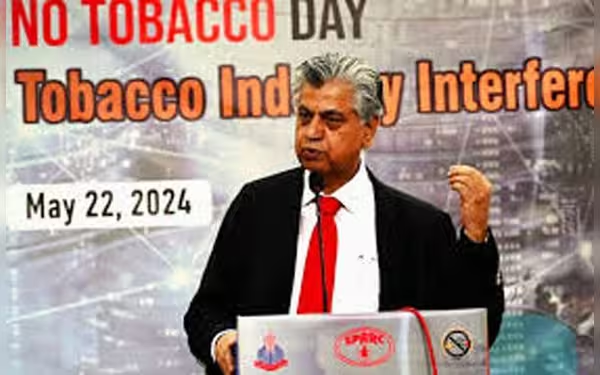Thursday, July 4, 2024 06:36 PM
SPARC and PGC Advocate for Tobacco-Free Pakistan
- Youth empowerment against tobacco's harmful effects
- Urgent need for stringent tobacco control policies
- Academic institutions crucial in combating tobacco use
 Image Credits: nation_pk
Image Credits: nation_pkThe event organized by SPARC and PGC highlights the urgent need for Pakistan to address tobacco consumption among its youth population. Experts emphasize the risks of tobacco addiction and the importance of stringent regulations to protect public health and future generations.
Amidst the growing concerns surrounding tobacco consumption in Pakistan, a recent event organized by the Society for the Protection of the Rights of the Child (SPARC) in partnership with the Punjab Group of Colleges (PGC) shed light on the urgent need to address this critical issue. The event, held to mark World No Tobacco Day 2024, focused on empowering the youth to stand against the harmful effects of tobacco.
The event highlighted the alarming fact that Pakistan is currently home to its largest youth population ever. However, lax tobacco control policies have made this demographic susceptible to exploitation by the tobacco industry, putting their health and future at risk.
Experts emphasized that tobacco and nicotine addiction can serve as gateways to other forms of substance abuse, leading to severe health and mental health challenges among young people. Without stringent regulations to curb the tobacco industry's influence on the youth, the country faces a grim future with increasing deaths and diseases.
Pakistan is grappling with a high prevalence of tobacco use, with over 31.9 million adults aged 15 and above identified as current tobacco users. This accounts for nearly 19.7% of the adult population, with smoking-related illnesses claiming over 160,000 lives annually.
The World Health Organization and the World Bank have consistently urged Pakistan to enhance its tobacco taxation policies. A recent 26.6% Federal Excise Duty (FED) increase for the fiscal year 2024-25 has been viewed as a significant step forward by the Country Head of Campaign for Tobacco-Free Kids (CTFK). This increase not only has the potential to reduce healthcare costs and deter smoking but also to generate revenue for public health initiatives, benefiting the national economy.
Academic institutions, as emphasized by the Director of Punjab Group of Colleges, play a crucial role in combating tobacco use. By actively discouraging tobacco consumption and promoting wellness, educational institutions can create healthier environments for students and staff, fostering a culture where smoking is neither accepted nor glorified.
The event also drew attention to the deceptive marketing tactics of the tobacco industry, such as the sale of 10-stick cigarette packs targeting children and adolescents due to their affordability. It was stressed that government intervention is essential to counter this threat to public health.
The event recognized individuals from various sectors who have dedicated themselves to the mission of establishing a tobacco-free Pakistan. This collective effort underscores the commitment to building a healthier and more resilient nation for current and future generations.













